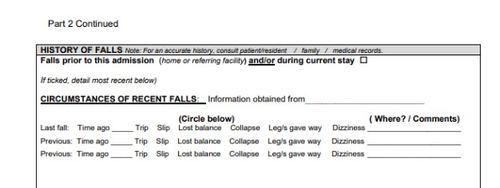The Definitive Guide for Dementia Fall Risk
Table of ContentsThe 3-Minute Rule for Dementia Fall RiskThe 9-Minute Rule for Dementia Fall RiskDementia Fall Risk - QuestionsWhat Does Dementia Fall Risk Do?The Single Strategy To Use For Dementia Fall Risk
In the community, insufficient road illumination or vulnerable creeks and land fills might also trigger accidents. Autumns Threat Evaluation Device (FRAT) is a 4-item falls-risk testing tool for sub-acute and household care. The FRAT has 3 sections: drop threat status, danger factor checklist, and activity plan. An Autumn Threat Status consists of data concerning history of current falls, drugs, psychological and cognitive standing of the client.If the individual ratings on a threat variable, the corresponding number of points are counted to the client's autumn threat rating in the box to the far. If a person's loss threat rating amounts to 5 or higher, the person is at high danger for drops. If the person ratings just four points or reduced, they are still at some risk of dropping, and the nurse must use their best professional evaluation to handle all autumn danger aspects as part of a holistic care strategy.
These typical approaches, in general, assist develop a risk-free setting that lowers accidental drops and delineates core precautionary steps for all individuals. Signs are crucial for people at danger for drops.
The Of Dementia Fall Risk
For instance, wristbands must include the client's last and given name, date of birth, and NHS number in the UK. Information need to be printed/written in black versus a white history. Just red color needs to be made use of to signify unique patient condition. These referrals are regular with existing growths in person recognition (Sevdalis et al., 2009).
Products that are too much might call for the person to get to out or ambulate needlessly and can potentially be a threat or contribute to falls. Helps protect against the person from heading out of bed without any type of support. Nurses reply to fallers' telephone call lights faster than they do to lights started by non-fallers.
Visual problems can substantially cause falls. Keeping the beds closer to the floor reduces the threat of falls and significant injury. Positioning the bed mattress on the flooring substantially reduces loss risk in some health care settings.
Not known Details About Dementia Fall Risk
Individuals who are tall and with weak leg muscular tissues who attempt to rest on the bed from a standing placement are most likely to drop onto the bed due to the fact that it's too low for them to decrease themselves safely. If a high person efforts to obtain up from a low bed without support, the client is most likely to drop back down onto the bed or miss out on the bed and drop onto the flooring.
They're created to check this promote timely rescue, not to stop drops from bed. Distinct alarm systems can additionally advise the patient not to get up alone. The use of alarms can likewise be a replacement for physical restrictions. Other than bed alarm systems, increased supervision for risky individuals likewise may assist avoid falls.

Patients with an evasion stride boost fall opportunities drastically. To lower loss threat, footwear should be with a little to no heel, slim soles with slip-resistant walk, and support the ankles. Advise patient to make use of nonskid socks to protect against the feet from gliding upon standing. Encourage clients to use proper, well-fitting shoesnot nonskid socks for motion.
Not known Facts About Dementia Fall Risk
Patients, particularly older grownups, have actually decreased visual capability. Lighting an unknown atmosphere aids increase exposure if the person should stand up in the evening. In a research study, homes with adequate illumination record fewer drops (Ramulu et al., 2021). Improvement in illumination in the house may lower fall prices in older grownups (Dementia Fall Risk). Using stride belts by all health and wellness care companies can advertise safety when aiding individuals with transfers from bed to chair.
.png)
Sitters work for assuring a secure, protected, and safe atmosphere. Researches showed really low-certainty proof that caretakers minimize autumn danger in acute care healthcare facilities and just moderate-certainty that options like video clip tracking can minimize sitter use without enhancing fall risk, suggesting that caretakers are not as helpful as initially thought (Greely et al., 2020).
The Main Principles Of Dementia Fall Risk

Increased physical conditioning decreases the risk for drops and limits injury that is sustained when loss takes place. Land and water-based workout programs might be in a similar way helpful on balance and stride and consequently reduce the threat for falls. Water workout may add a positive advantage on balance and stride for women 65 years and older.
Chair Surge Exercise is a simple sit-to-stand exercise that aids enhance the muscles in the upper legs and buttocks and enhances mobility and freedom. The goal is to do Chair Surge exercises without making use of hands as the client comes to be more powerful. See resources section for a comprehensive instruction on how to carry out Chair Increase workout.